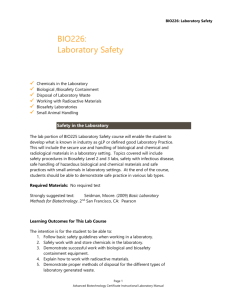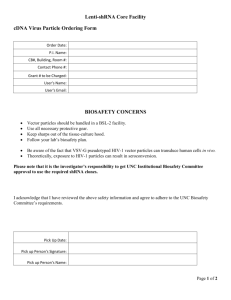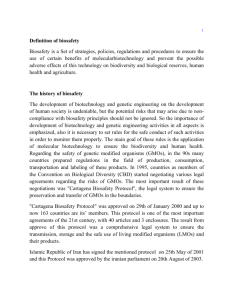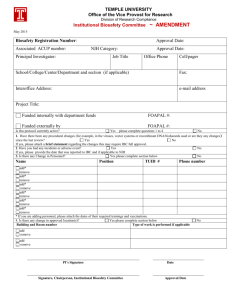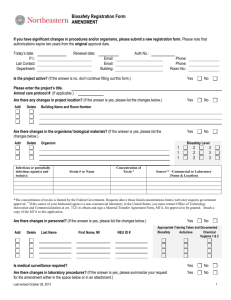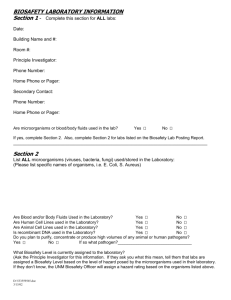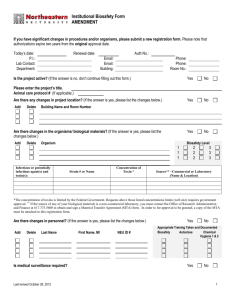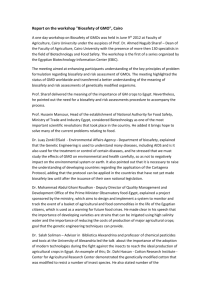BIOSAFETY, BIOETHICS AND BIOPOLICY, Course Code: BBT3503
advertisement
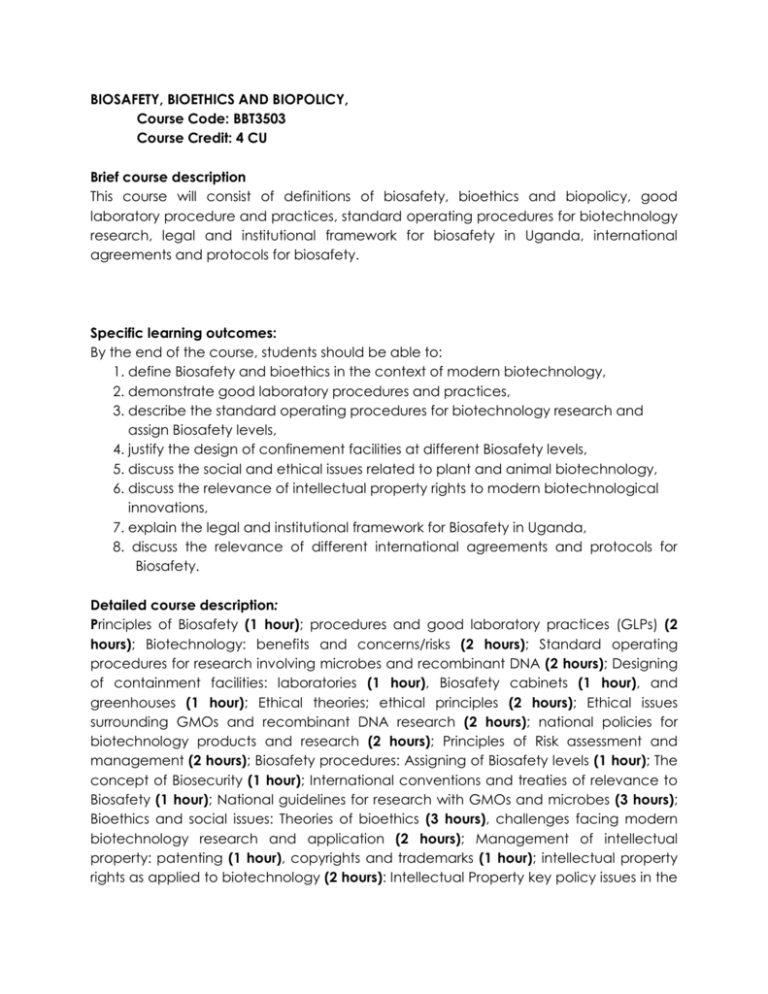
BIOSAFETY, BIOETHICS AND BIOPOLICY, Course Code: BBT3503 Course Credit: 4 CU Brief course description This course will consist of definitions of biosafety, bioethics and biopolicy, good laboratory procedure and practices, standard operating procedures for biotechnology research, legal and institutional framework for biosafety in Uganda, international agreements and protocols for biosafety. Specific learning outcomes: By the end of the course, students should be able to: 1. define Biosafety and bioethics in the context of modern biotechnology, 2. demonstrate good laboratory procedures and practices, 3. describe the standard operating procedures for biotechnology research and assign Biosafety levels, 4. justify the design of confinement facilities at different Biosafety levels, 5. discuss the social and ethical issues related to plant and animal biotechnology, 6. discuss the relevance of intellectual property rights to modern biotechnological innovations, 7. explain the legal and institutional framework for Biosafety in Uganda, 8. discuss the relevance of different international agreements and protocols for Biosafety. Detailed course description: Principles of Biosafety (1 hour); procedures and good laboratory practices (GLPs) (2 hours); Biotechnology: benefits and concerns/risks (2 hours); Standard operating procedures for research involving microbes and recombinant DNA (2 hours); Designing of containment facilities: laboratories (1 hour), Biosafety cabinets (1 hour), and greenhouses (1 hour); Ethical theories; ethical principles (2 hours); Ethical issues surrounding GMOs and recombinant DNA research (2 hours); national policies for biotechnology products and research (2 hours); Principles of Risk assessment and management (2 hours); Biosafety procedures: Assigning of Biosafety levels (1 hour); The concept of Biosecurity (1 hour); International conventions and treaties of relevance to Biosafety (1 hour); National guidelines for research with GMOs and microbes (3 hours); Bioethics and social issues: Theories of bioethics (3 hours), challenges facing modern biotechnology research and application (2 hours); Management of intellectual property: patenting (1 hour), copyrights and trademarks (1 hour); intellectual property rights as applied to biotechnology (2 hours): Intellectual Property key policy issues in the research setting (2 hours); Protection of traditional knowledge for biotechnology innovation (3 hours); national and international and legal and regulatory framework for Intellectual property and relevance to biotechnology (3 hours); Challenges of Biotechnology policy development and implementation (2 hours); Features of the Uganda biotechnology and Biosafety policy and its linkage to other national and global policies (2 hours). Practicals (30 hours) Mode of delivery: The course will consist of lectures, practicals and tutorials Assessment method: This will be done through examinations (60%) and coursework (practicals, tests and assignments) (40%) REFERENCE LIST 1. DUTFIELD, G. (1997). Can TRIPS Agreement Protect Biological and Cultural Diversity? Biopolicy International. 2. HENDRIX, F., KOESTER, V and PRIP, C. (1994). Access to Genetic Resources. In Biodiplomacy: Genetic Resources and International Relations. Edited by V. Sanchez, ans Juma, C, Nairobi, Act Press. 3. KLEMM, C. De. (1990). Wild Plant Conservation and the Law. IUCN Environmental Policy and Law Paper Number 24. ICN 4. MUGABE, J, BARBER, C.V, HENNE, G, GLOWKA, L and LA VINA, A. (1996). Managing Access to Genetic Resources : Towards Strategies for Benefit-Sharing. 5. NELSON, D.L and COX, M.M. (2008). Principles of Biochemistry. Fifth Edition. W.H. Freeman and Company. New York 6. TANUI, W.K. (2007). Laboratory Safety Handbook. 1st Edition. King’s Script Publishers.
